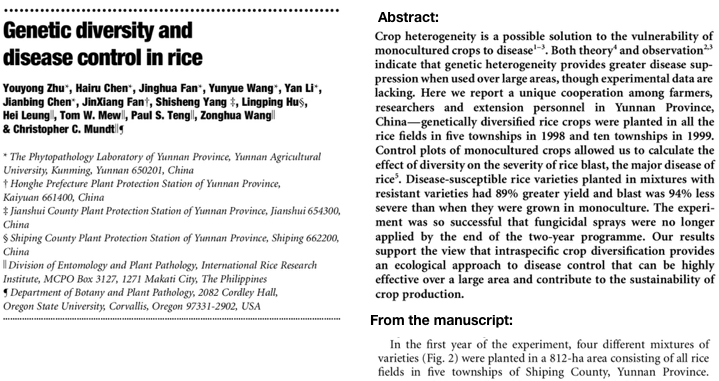Ethics in science
Introduction
"Erst kommt das Fressen, dann kommt die Moral" (First comes food, then comes ethics)
Bertolt Brecht, German Writer
The goal of this lesson is to outline that ethics is of great relevance on each level of scientific activities.
Ethics, which comes from the greek word ‘ethos’ (behaviour) asks two critical questions:
- What whould we do?
- How should we live?
Ethics deals with questions about which forms of human conduct are morally good or bad.
As subject of systematic investigation, it is part of philosophy.
However, ethical questions appeas in all aspects of life.
There are two possible approaches to find answers to the above two questions. To ask for an external answer, which means to listen to God. In this case, one relies to a divine law: If god says something is wrong, it is absolutely and eternally wrong, and humans can not do anything about it. But there are problems with such an approach:
How to find out what god thinks? Fundamentalists think that what is wrong and what is not wrong according to God is written in the scriptures that characterizes many religions The second problem is: How to find out which signals come from god? This is exemplified in the following idea:
But how did the people in the scripture know the signals they were getting were really from God? Abraham thought he was called by God to sacrifice his son on the altar. Abraham figures, “If God says so, I’d better do it.” Our first philosophical query to Abraham is, “What are you, nuts? You hear ‘god’ tell you to do a crazy thing, and you don’t even ask for identification?” (Cathcart and Klein, 2009)
Another problem is to interpret the will of God. There is usually much room for interpretation. What does the Bible say about the genetic engineering of plants? Plant genetic engineering did not exist when the bible was written!
The alternative is to look for an internal answer, as suggested by the German philosopher Immanuel Kant to liberate ourselves from the self-inflicted nonage. The most famous rule on how to behave is from Kant, which is the categorical imperative or the golden rule:
Do unto others as you would have other do unto you.
This rule is universal in that respect that variations of the rule are found in many religious traditions around the world.
There are three kinds of ethics (Resnik, 2005):
- Normative ethics
- is the study of standards, principles, concepts, values and theories.
- Applied ethics
- deals with ethical dilemmas, choices and the standards in various occupations, professions and particular situations where action is required. It also comprises the application of moral theories and concepts in particular contexts. Examples are medical ethics, bioethics, business ethics, etc.
- Meta ethics
- is concerned with the process on how to find and define rules for ethical behaviour. It asks questions about the nature and justification of moral standards, values, principles and theories, as well as the meaning of moral concepts. Important questions are: “Is science objective?” and “Why should we obey moral obligations?”
Ethics has derived some basic moral principles or guidelines for conduct that can be universally applied:
- Nonmalificence:
- Do not harm yourself or other people
- Beneficence:
- Help yourself and other people
- Autonomy:
- Allow rational individuals to make free, informed choices
- Justice:
- Treat people fairly; treat equals equally, unequals, unequally.
- Utility:
- Maximize the ratio of benefits to harms for all the people.
- Fidelity:
- Keep your promises and agreements
- Honesty:
- Do not lie, defraud, deceive, or mislead
- Privacy:
- Respect personal privacy and confidentiality
Sometimes there are moral dilemmas that require ethical choices. A simple way of practical reasoning to solve the dilemma, or at least to make a decision is:
- Step 1: Frame a set of questions
- Step 2: Gather information
- Step 3: Explore different options
- Step 4: Evaluate options
- Step 5: Make a decision
- Step 6: Take action
One of the key questions of ethics is whether it is possible for formulate a general set of rules that allow the formulation of a universally valid moral framework. In the Western world, moral relativism has become quite prominent, for the following reasons:
- A decline in religion
- A reaction to the abuses of colonialism (destruction of indigenous societies)
- Multiculturalism: Cultural diversity with different systems of norm
- Science: Is science the only arbiter of truth? Does Darwin’s theory undermine the believe in objective standards?
- Philosophy: Nietzsche and Sartre have questioned the objectivity of ethics and proposed versions of moral relativism.
The ethics of science is a special area within the general field of ethics.
There are other concepts, which challenge the assumption that there are universally objective answers to ethical questions.
Ethnocentralism states that scientists judge ethical problems from their own, unique view. Such a study is relevant in the study of tribal societies, for example societies, which exercise cannibalism.
Ethics can also be defined in the context of neurobiology and evolution.
Ethics of science
The ethics of science can be differentiated into three domains:
- Ethics of the scientist
- Ethics of scientific experiments
- Ethics of scientific research
Ethics of the scientist
A scientist is expected to work according to some scientific standards. These standards are defined by science funding agencies or by science journals. For example, the science funding agencies, published rules for correct scientific conduct. They were imposed after some major scandals of scientific misbehaviour became public. They are called “Safeguarding Good Scientific Practice”, which were established by the Comission on Professional Self Regulation in Science of the Deutsche Forschungsgemeinschaft (DFG) (Deutsche Forschungsgemeinschaft DFG, 2013). All recipients of a grant proposal from the DFG have to declare that they will obey the rules. The document is somewhat lengthy, but you will the main recommendations taken from this document.
Ethics of scientific experiments
Independent of the way a scientist conducts his or her research, there is an ethics independent of the scientist. An experiment can be done in principle by any researcher and it can be carried out according to the standards of scientific research, but it still can be unethical.
Examples are the experiments by the Nazi doctors. For example, Sigmund Rascher (1909-1945) (Wikipedia) was a medical doctor who conducted scientific experiments according to the medical standards of the time (Figure 1). The experiments were driven by the request of the German army to rescue the pilots who were shot down over the sea and were frequently dying in the cold water, and to do research on the effects of high altitude on plane pilots. Rascher was a member of the Ahnenerbe, the science organisation of the SS (Wikipedia) and his research was funded by precedessor organisation of the DFG. The experiments were unethical because the subjects were forced to participate and they were inmates of the concentration camps in Dachau and Auschwitz. Many test persons died or were killed after the experiments.

This is just one example of unethical experiments that were conducted during the Nazi period in Germany. A good summary is provided by Cornwell (2004).

Doing experiments against the will of people or that may put the live of people at risk may be unethical. But what if there may be a useful outcome?
One example is one of the largest agricultural experiments ever done. In this experiment, farmers in the province of Yunnan in China were convinced to sow a mix of two rice varieties to dampen rice blast epidemics (Zhu et al., 2000). The ethical question was whether the survival of smallholder farmers, who strongly depend on their annual harvest, can be put at risk for a scientific experiment. However, since the experiments was so successful that the farmers stopped spraying pesticides in fields with mixed seeds.
Since the beginning of the modern era of science there have been numerous other ethically questionable scientific experiments.
Ethics of scientific results
A third aspect concerns the outcome of scientific research. If the scientist works ethically, the experiment was carried out according to accepted ethical standards and legal regulations, there is still the possibility that the results may be unethical if they applied.
This can be demonstrated with the following example. Norman Borlaug has saved millions of lives by co-inventing and managing the first green revolution. But this has come at a price: A strong dependency on limited genetic resources, on fertilizer and pesticides that have a strong effect on the environment and deplete resources. Could it be that the green revolution in the long run cause the death of more people than it has saved in the short term if the resources run out or become too expensive? Should we let the issue decide entirely in the political arena? Scientific results do not provide a definite answer, ethics neither. Should the market decide or politics? If so, which society can we expect?
In general, the introduction of new technologies is ‘disruptive’ and nearly always has positive and negative aspects. As technology evolves, negative aspects may be mitigated.
Especially in the context of genetically engineering of organisms, these questions are highly relevant.
Why is ethics important for science?
As shown in the previous section, ethical considerations play a role in all aspects of science. They have to bee seen in the context of the goals of science, the research environment, and the scientific method.
This includes the standards of ethical conduct in science and requires to consider honesty, carefulness, openness, freedom, credit, education, social responsibility, legality, opportunity, mutual respect, efficiency and a respect for subjects.
An important aspect that is derived from the scientific method is objectivity in research. It needs to be achieved, and therefore points to consider are honesty in research, misconduct in science, error and self-deception, bias in research, conflicts of interest, openness and data management.
A particular field are ethical issues in scientific publication. The important issues are the objectivity in publication, the giving of credit, the rules of authorship, intellectual property, and the relationship between science, the media and the public.
Within research groups, ethical behaviour is of utmost importance. This includes the relationship between the mentor and mentee, the harassment of co-workers, the reporting of misconduct occurring in a group, the roles of teaching versus research, issues in hiring and recruitment, and the sharing and preserving of resources. In different groups and institutes, usually there are standards and customs of conduct that can differ, but often implement ethical rules. Very often research groups and institutions, but increasingly also scientific conferences and digital communities share a code of conduct, which defines acceptable and inacceptable behaviour. Another important point is to consider the research on human and animal subjects.
Finally, scientist are part of society and there are many issues to consider. These include the social responsibility, a role as expert in court testimonies, political hearings or in government committees. Also, the relationship between academic and industrial science, the question of whether or not to conduct military research, the use (and abuse) of public research funds.
Ethical aspects and rules in the context of science and technology
The precautionary principle
In recent years, society changed its attitude towards risk. Generally, there has been a positive attitude towards new technologies and a rather optimistic outlook into the future (at least from 1945 to the 1980s), but after some scandals and environmental catastrophies the attitude has changed considerably. Now, new technologies that may affect the environment are seen much more sceptical.
The precautionary principle (PP) is frequently the rule of action, not only by critical citizens but also by government institutions. In its simplest form, the precautionary principle states that ‘one shall not take any unnessecary risk’. However, there are more than a dozen defitions of the PP. It is closely linked to the German Vorsorgeprinzip (foresight principle), which is part of the German environmental law.
One consequence is that it is very difficult to introduce new technologies such as GMO plants because risk can never be completely excluded. Many scientists, who are proponents of GMO, say that it is a call for non-action and the preservation of the status quo. Also, currently established technologies need to be evaluated with the same criteria as new, potentially risky or beneficial technologies.
The European court of Justice has ruled in 2017 that the PP is a dynamic principle, which has to consider scientific progress:
a correct application of the precautionary principle presupposes, first, identification of the potentially negative consequences for health […], and, second, a comprehensive assessment of the risk to health based on the most reliable scientific data available and the most recent results of international research.
- Source: ECJ, Case C-282/15, Queisser Pharma GmbH & Co. KG ./. Federal Republic of Germany, ECLI:EU:C:2017:26, paragraph 56
Ethics of attitude versus ethics of responsibility
There are two types of ethics in the German philosophical tradition. Gesinnungsethik (ethics of attitude), values the moral principles more than actions, whereas Verantwortungsethik (ethics of responsibility) is more directed towards actions as long as they are responsible. The latter has less of a problems to get his hands dirty as the first one as long as it serves a right moral cause.
Under an ethics or responsibility those actions are to be preferred if resources are limited, which have the greater impact. The problem is, then, that the consequences of the actions are difficult to predict.
The distinction between the two types of ethics was made by the German Sociologist Max Weber in his essay ‘Politics as a profession’ (Weber, 2009).
The ecological imperative of Hans Jonas
A modern definition of the categorical imperative of Kant was developed by the Jewish-German Philosopher Hans Jonas (Wikipedia). In his book “The Imperative of Responsibility: In Search of Ethics for the Technological Age” (Jonas, 1985) he develops the ecological imperative:
Act in a way that the consequences of your actions are compatible with the permanency of true human life on Earth.

Do we need ethical rules for plants?
Until recently, plant scientists never had to think much about experimenting with their subjects. This has changed in 2004 in Switzerland. There, an ethics committee of the government on non-human biotechnology developed criteria that should aid research funding agencies to decide which experiments affected the dignity of plants (Non-Human Biotechnology (ECNH), 2008). Hence, research projects on plants may become unfundable if they violate such guidelines. The core of the report is a decision tree that takes the issues at stake into account. However, no detailed examples of research that would plant dignity was given. Genetic engineering was not ruled out as unethical per se. In Switzerland, there is a gene technology law from 2004 that states that the ‘dignity of creatures’ should be considered, which is based on the recommendations of this committee. Scientists must now state in their proposals that they considered plant dignity. The same committee also issued recommendations on the so-called ‘Terminator technology’, which is a genetic engineering technology that renders plants sterile so that farmers have to purchase seeds every year.
It is remarkable that there was no leading plant scientist in the committee, which was dominated by philosophers and theologicians.
The concept of dignity in the context of plants has met widespread criticism.
Key arguments against it are:
- A slippery slope: How are boundaries of ethical and unethical actions defined?
- The concept of dignity: Is dignity achieved or is it inborn? (Abbott, 2008)
- It is seen as a form to opposed against modern plant biotechnology research Abbott (2008)
In replies to these criticisms, it has been argued that recent research showed that plants can sense their environment and make decisions and therefore may have some kind of subjective sensation, or even some kind of intelligence. Accordingly, plant’s
Dignity could be a sign that plants are to be respected and that there are also certain obligations towards them. Koechlin (2009)
Possible actions that violate plant dignity are the arbitrary picking of roadside flowers, or the instrumentalisation and industrialization of plants for maximizing economic profits.
Summary
- Ethical questions occur at each level of scientific activity.
- Ethics strives to achieve responses to ethical dilemmas that do not rely on external authorities such as a god.
- Applied and practical ethics provides a framework to solve ethical dilemmas, which are derived from basic philosophical principles.
- The universality of ethics has been challenged and relativistic attitudes and philosophies to ethics exist.
- The precautionary principle is an important concept of ethics that (at least in Europe) plays an important role in the legislation of scientific research and its outcomes.
- Closely related concepts are the ethics of attitudee and the ethics of responsibility
- There is a view that plants also have a dignity and ethical value per se.
Key concepts
Further reading
Study questions
- Assume that you are challenged with a new ethical dilemma, for which no current applied ethics (or laws) provide guidelines for action. How would you approach such a dilemma to find a solution?
- Which ethical dilemmas can a scientist experience if she or he is interacting with society (e.g., in political discussions, government committees, public outreach). How can such dilemmata be resolved, or at least minimized?
- We stated that ethics could be defined in the context of evolutionary biology. If we assume that the survival of the fittest is a key principle of evolutionary biology, how is it possible to derive ethical rules? Would these rules be universally valid or not?
- What are the key arguments that plants have a dignity and therefore should treated with respect? Is is possible to derive clear rules for research and cultivation of plants?
In class exercises
Background
Human actions often result in an ethical dilemma. A simple way of practical reasoning to solve ethical dilemmas, or at least to make a decision is:
- Step 1: Frame a set of questions
- Step 2: Gather information
- Step 3: Explore different options
- Step 4: Evaluate options
- Step 5: Make a decision
- Step 6: Take action
Test of a new method for crop cultivation
The following abstract describes a potential approach for crop disease management that is influenced by Darwinian principles.

Which ethical dilemmas do you recognize in the project and which approach would you suggest to solve them?
Golden rice
The “golden rice” is a highly controversial outcome of plant biotechnological research. The development of golden rice is described in this Wikipedia article: Link.
- Describe the potential and the problems with this approach
- How could the ethics of responsibility and ethics of attitude applied here?
- How can the precautionary principle be used or abused in the contect of the golden rice?
Do plants have a dignity?
We watch the short presentation (14 min) by Florienne Koechlin on “Tomatoes talk, birch trees learn – do plants have dignity?”.
During the presentation, please note the following aspects of Florienne Koechlin’s talk:
- How often does she refer to scientific studies? In which way does she refer to scientific studies?
- How are plants represented (in comparison to, e.g., humans)? Do you think it is appropriate or not?
- Does she provide practical recommendations that would be relevant for scientists, farmers and consumers?
- Do you consider her neutral with respect to her subject or does the have a (hidden) agenda?
- Are you convinced by her arguments about the dignity of plants? Why or why not?
